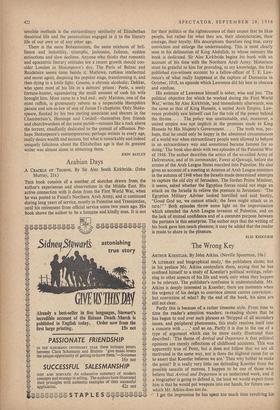Arabian Days
THIS book consists of a number of sketches drawn from the author's experiences and observations in the Middle East. His active connection with it dates from the First World War, when he was posted to Faisal's Northern Arab Army, and it continued during long years of service, mostly in Palestine and Transjordan, until his retirement from official service some two years ago. His book shows the author to be a humane and kindly, man. It is not for their politics or the righteousness of their causes that he likes people, but rather for what they are, their idiosyncracies, their courage, their loyalty. His descriptions therefore ring true, carry conviction and enlarge the understanding. This is most clearly seen in his delineation of King Abdullah, to whose memory the book is dedicated. Sir Alec Kirkbride begins his book with an account of his time with the Northern Arab Army. Historians must be grateful to him for providing, to my knowledge, the first published eye-witness account by a fellow-officer of T. E. Law- rence's of what really happened at the capture of Damascus in October, 1918, an episode which Lawrence did his best to obscure and confuse.
His estimate of Lawrence himself is sober, wise and just. 'The political objective for which he worked during the First World War,' writes Sir Alec Kirkbride, 'and immediately afterwards, was the same as that of King Hussein, a united Arab Empire. Law- rence probably saw himself cast for the role of the power behind the throne. . . . The policy was unattainable, and, moreover, a united empire was not implicit in the promises made to King Hussein by His Majesty's Government. . . . The truth was, per- haps, that he could only be happy in the abnormal circumstances of a world war when extraordinary people were allowed to behave in an extraordinary way and sometimes became famous for so doing.' The book also deals with two episodes of the Palestine War of 1948. The author describes the antics of the so-called Army of Deliverance, and of its commander, Fawzi al-Qawuqji, before the armies of the Arab League States marched into Palestine. He also gives an account of a meeting at Amman of Arab League ministers in the autumn of 1948 when the Israelis made determined attempts to capture the old city of Jerusalem. The Jordan Prime Minister, it seems, asked whether the Egyptian forces could not stage an attack on the Israelis to relieve the pressure in Jerusalem : 'The Egyptian Military Adviser looked horrified and said hastily, "Good God no, we cannot attack; the Jews might attack us in turn !" ' Both episodes throw some light on the improvisation which attended the Arab League invasion of Palestine, and on the lack of mutual confidence and of a common purpose between the partners in this enterprise. The author says that the writing of his book gave him much pleasure; it may be added that the reader is made to share in the pleasure.
ELIE KEDOURIE


































 Previous page
Previous page